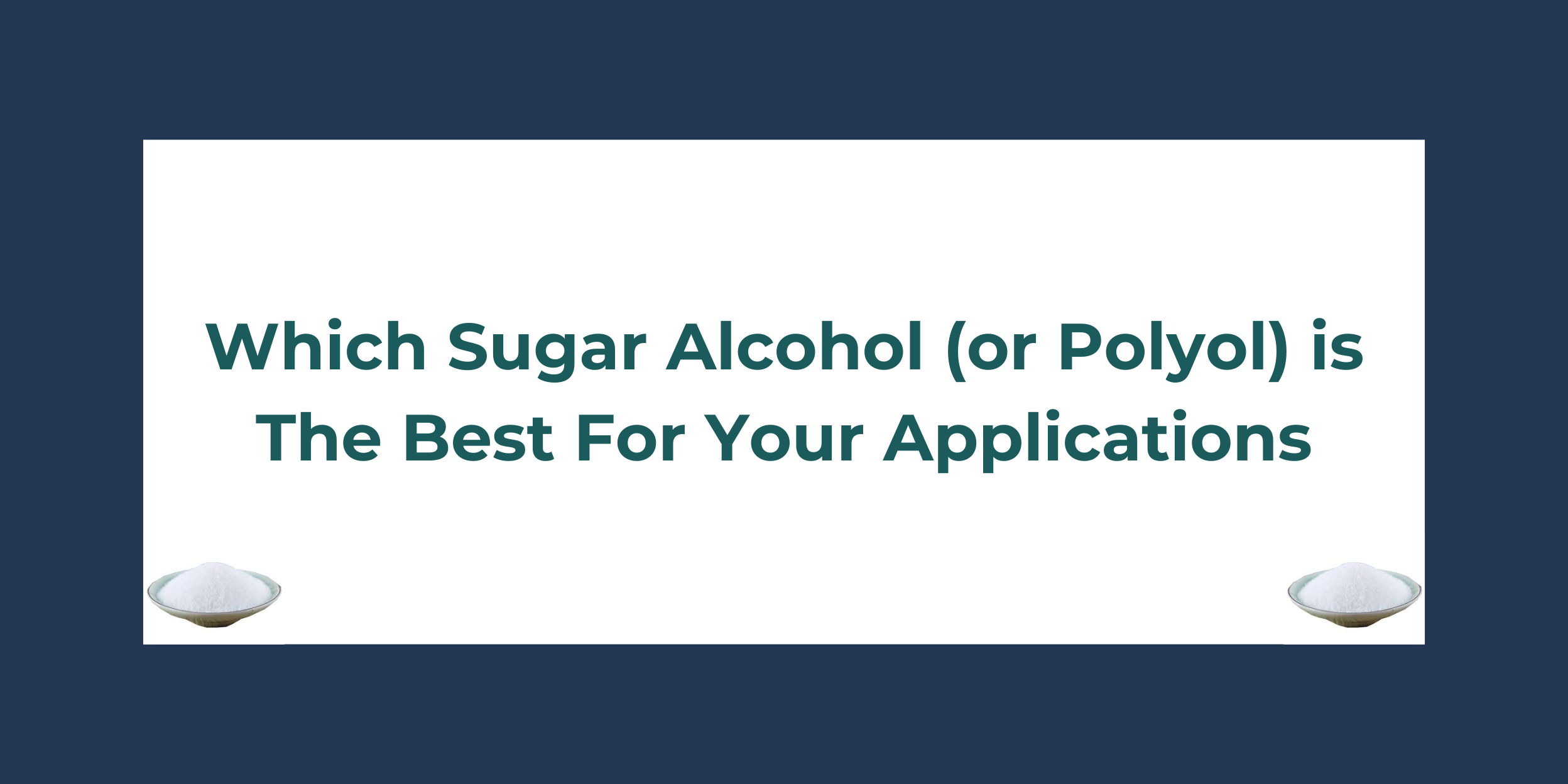Sugar alcohols (also known as Polyol) have a wide range of applications in the food and pharmaceutical industries.
They are often used as low-calorie sweeteners and bulking agents in sugar-free and reduced-calorie foods and beverages.
Sugar alcohols provide sweetness similar to sugar but with fewer calories and a lower impact on blood sugar levels, making them popular in products aimed at diabetics and individuals looking to reduce their sugar intake.
In addition to their sweetening properties, sugar alcohols also have functional benefits. They can improve the texture, mouthfeel, and shelf life of products, especially in baked goods and confectionery. They also have cariogenic properties, making them safe for use in Dental products.
In this blog, we will compare these sugar alcohols for their unique nature & properties as well as their drawbacks,, which may help identify the best sugar alcohol for your applications:
- Maltitol
- Sorbitol
- Lactitol
- Isomalt
- Xylitol
- Erythritol
Comparison of General Properties of Sugar Alcohol
Sweetness::
- Maltitol: 90% as sweet as sucrose.
- Sorbitol: 60% as sweet as sucrose.
- Lactitol: 30-40% as sweet as sucrose.
- Isomalt: 45-65% as sweet as sucrose.
- Xylitol: 100% as sweet as sucrose.
- Erythritol: 60-80% as sweet as sucrose.
Caloric Content:
- Maltitol: 2.1 calories per gram.
- Sorbitol: 2.6 calories per gram.
- Lactitol: 2 calories per gram.
- Isomalt: 2 calories per gram.
- Xylitol: 2.4 calories per gram.
- Erythritol: 0.2 calories per gram.
Glycemic Index:
- Maltitol: 35.
- Sorbitol: 4.
- Lactitol: 6.
- Isomalt: 9.
- Xylitol: 13.
- Erythritol: 0.0
Digestive Tolerance:
- Maltitol: Can cause digestive discomfort and have a laxative effect in some individuals, especially in large amounts.
- Sorbitol: Can cause digestive discomfort and have a laxative effect in some individuals, especially in large amounts.
- Lactitol: Can cause digestive discomfort and have a laxative effect in some individuals, especially in large amounts.
- Isomalt: Can cause digestive discomfort and have a laxative effect in some individuals, especially in large amounts.
- Xylitol: Can cause digestive discomfort and have a laxative effect in some individuals, especially in large amounts.
- Erythritol: Generally well tolerated, with minimal digestive side effects even in large amounts.
Dental Health:
- All of these sugar alcohols are Non-Cariogenic, and do not cause any dental harm or decay
Hygroscopicity (Ability to Absorb Moisture):
- Maltitol: High hygroscopicity, which can affect the texture and shelf life of products.
- Sorbitol: High hygroscopicity, which can affect the texture and shelf life of products.
- Lactitol: Moderate hygroscopicity.
- Isomalt: Low to moderate hygroscopicity.
- Xylitol: Low hygroscopicity.
- Erythritol: Very low hygroscopicity.
Unique characteristics
Maltitol: Maltitol is known for its similarity in taste and texture to sucrose, making it a popular choice as a sugar substitute in a wide range of products. It provides sweetness without the strong cooling effect often associated with other sugar alcohols.
Sorbitol: Sorbitol has a unique ability to retain moisture, making it valuable in products where moisture retention is important, such as in certain candies and baked goods. It also has a lower caloric content compared to sugar.
Lactitol: Lactitol is unique in that it has prebiotic properties. It is undigested till it reaches gut, and is partially digested by the good bacteria, creating prebiotic benefits
Isomalt: Isomalt is unique in its heat stability, making it suitable for use in products that require heating, such as baked goods and confectionery. It also has a low glycemic index, making it suitable for people with diabetes.
Xylitol: Xylitol is unique in its ability to inhibit the growth of bacteria in the mouth, making it beneficial for dental health. It is often used in chewing gums and oral care products.
Erythritol: Erythritol is unique in that it has a negligible effect on blood sugar levels and is almost completely absorbed in the small intestine, leading to minimal digestive issues compared to other sugar alcohols. It also has a cooling effect, similar to mint.
Comparison of Side Effects
Here’s a comparison of maltitol, sorbitol, lactitol, isomalt, xylitol, and erythritol based on their potential side effects:
- Digestive Issues: All sugar alcohols can cause digestive discomfort such as bloating, gas, and diarrhoea, especially when consumed in large amounts or by individuals sensitive to sugar alcohols.
However, erythritol tends to have very rare digestive side effects compared to the others.
- Laxative Effect: Sorbitol, maltitol, and lactitol are known to have a laxative effect, particularly in high doses.
- Toxicity (for xylitol): Xylitol can be toxic to dogs, so pet owners should be cautious when using products containing xylitol.
Overall, erythritol is often preferred due to its lower likelihood of causing digestive issues compared to the other sugar alcohols. However, individual tolerance varies, so moderation is key.
In conclusion, sugar alcohols offer a range of benefits and applications in the food and pharmaceutical industries.
They provide sweetness with fewer calories and a lower impact on blood sugar levels, making them suitable for diabetics and those watching their sugar intake.
Each sugar alcohol has unique properties, such as maltitol’s similarity to sucrose in taste and texture, sorbitol’s moisture retention ability, lactitol’s prebiotic properties and erythritol’s cooling property.
However, they can cause digestive issues and have a laxative effect, particularly in high doses. Erythritol stands out for its rare & minimal digestive side effects.
Overall, choosing the right sugar alcohol depends on the specific application, desired properties & individual tolerance.
Visit us here to explore our range of sugar alcohols and other alternative sweeteners.








